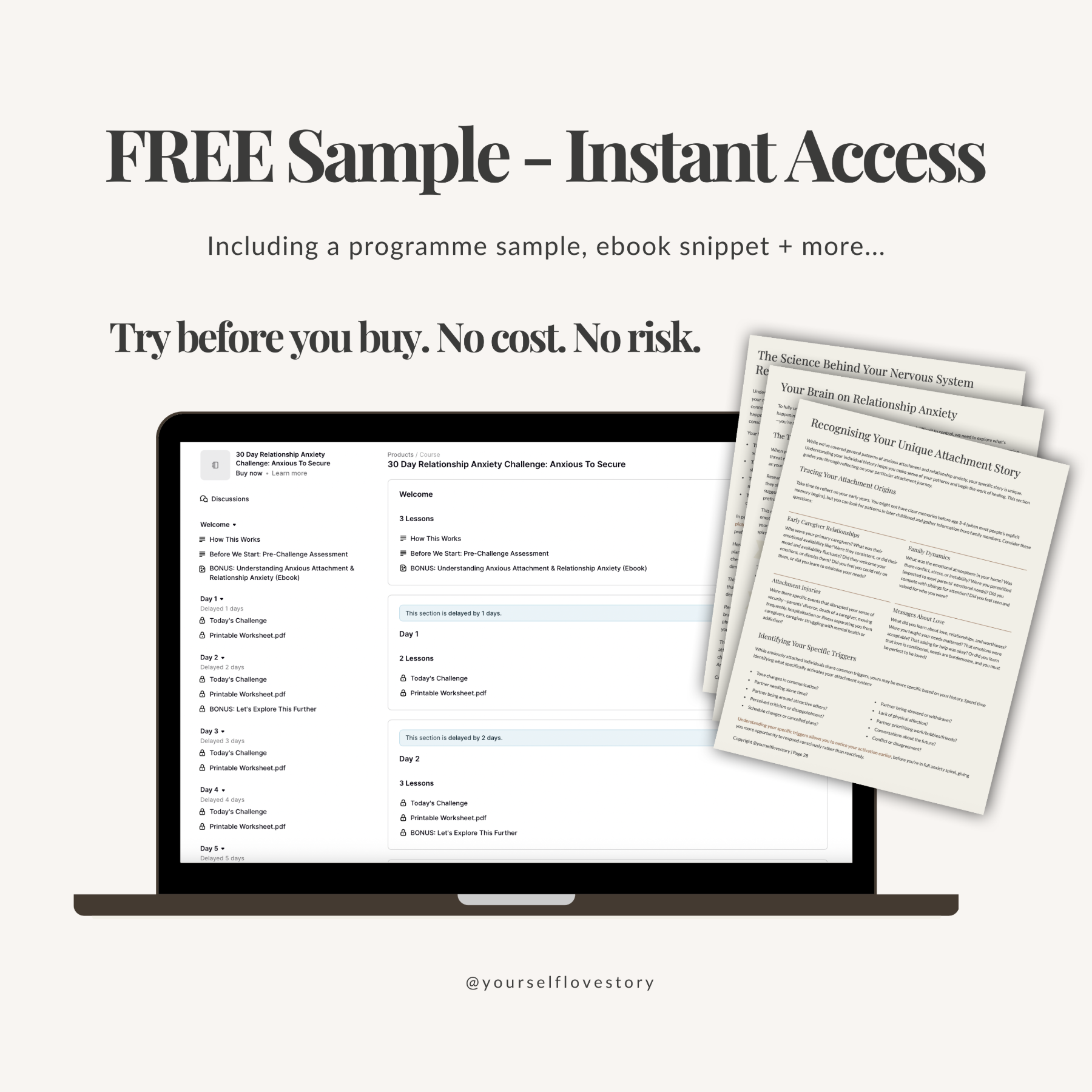- Nov 13, 2025
6 Relationship Anxiety Signs You Can't Ignore
If you've found yourself here, there's a good chance you're wrestling with something that feels both deeply personal and strangely isolating. Perhaps you're looking for relationship anxiety signs as you've noticed yourself checking your partner's phone, replaying conversations on an endless loop, or feeling an inexplicable panic when they don't text back immediately.
You might wonder if you're "just being crazy" or if there's something fundamentally wrong with you. Let me say this clearly: you're not crazy, and you're certainly not alone.
Relationship anxiety is far more common than most people realise, and it manifests in ways that can feel confusing and overwhelming. This isn't about being "too sensitive" or "overthinking things" - there are genuine psychological and neurological reasons why your mind might be working overtime when it comes to your relationship.
Understanding the signs of relationship anxiety is the first step towards reclaiming your peace of mind and building the secure, fulfilling connection you deserve.
So let's start by explaining what exactly relationship anxiety is, the difference between this and anxious attachment (plus the overlap and cause for confusion there), and of course, the key signs of relationship anxiety that you can't ignore...
What Exactly Is Relationship Anxiety?
Relationship anxiety is a persistent pattern of worry, doubt, and fear centred around your romantic relationship. It's characterised by intrusive thoughts about your partnership, constant questioning of your feelings or your partner's commitment, and a nagging sense that something might go wrong — even when there's no concrete evidence to support these fears.
What makes relationship anxiety particularly challenging is that it exists largely in your mind. Your logical brain might recognise that your partner loves you and that your relationship is healthy, yet your emotional brain sends urgent distress signals that something is terribly amiss. This disconnect can feel maddening and exhausting.
From a neurological perspective, relationship anxiety often involves an overactive amygdala — the part of your brain responsible for detecting threats. When this alarm system becomes hypersensitive, it can perceive danger in situations that aren't actually threatening, triggering your fight-or-flight response even during ordinary relationship moments. Your brain is genuinely trying to protect you; it's just working with faulty threat detection software.

Relationship Anxiety vs Anxious Attachment: Understanding the Difference
Here's the crucial distinction many people miss: you can experience significant relationship anxiety even if you have—or previously had—a relatively secure attachment style.
Perhaps you had a secure upbringing and healthy early relationships, but a painful breakup, betrayal, or traumatic relationship experience has left your nervous system on high alert. Maybe life stressors like work pressure, health concerns, or family issues are overwhelming your capacity to feel secure. Relationship anxiety doesn't discriminate based on your attachment history.
Whilst there are certainly overlaps between anxious attachment and relationship anxiety — both involve fear of abandonment and hypervigilance towards relationship threats — relationship anxiety can emerge independently. It's more about your current state of nervous system dysregulation and cognitive patterns than your foundational attachment blueprint.
Anxious Attachment
Developed in childhood based on early caregiving experiences
Core belief: "I'm not worthy of consistent love"
Rooted in developmental patterns
Affects how you relate across all relationships
Relatively stable trait unless addressed
Relationship Anxiety
Can develop at any time, even with secure attachment history
Core belief: "This relationship might fail"
Often triggered by specific circumstances
Primarily affects romantic relationships
Can be situational and fluctuate
Relationship Anxiety vs Anxious Attachment: FREE Quiz
Want to get clearer on whether you're battling solely with Relationship Anxiety, or whether this is combined with Anxious Attachment too? Then download our FREE self-guided quiz, to determine this with ease...

6 Relationship Anxiety Signs (You Can No Longer Ignore)
So what are some of the fundamental things you want to look out for when it comes to the signs of relationship anxiety? Well, things like...
1) The Constant Analysing: When Your Mind Won't Rest
One of the most exhausting relationship anxiety signs is the relentless mental analysis.
You might find yourself replaying conversations word-for-word, dissecting your partner's tone, facial expressions, or the exact phrasing they used. "Why didn't he say 'I love you' when we got off the phone? Does that mean his feelings are changing?" This isn't simple reflection—it's an obsessive loop that can come back to play on your mind, throughout the day.
Or perhaps you've noticed yourself creating elaborate narratives from minimal evidence. Your partner seems slightly quieter than usual, and suddenly you're convinced they're losing interest, planning to leave, or having an affair. You might find yourself seeking reassurance repeatedly, asking questions like "Do you still love me?" or "Are we okay?" even when they've just answered the same question yesterday.
Why Does This Happen?
Your brain's threat detection system is in overdrive, scanning for any possible sign of relationship danger.
The constant scanning for danger - actually mirrors PTSD symptoms. In fact, relationship anxiety can sometimes be a form of relational trauma or what some call "relationship PTSD."
The key difference is that traditional PTSD usually stems from life-threatening situations, while relationship anxiety often develops from emotional threats to your sense of safety, belonging, and worth.
The prefrontal cortex—responsible for rational thinking—becomes hijacked by the limbic system's emotional processing.
Essentially, you're trying to think your way to safety, but because the anxiety stems from your emotional brain, no amount of logical analysis can satisfy it. The more you analyse, the more material your anxious mind finds to worry about, creating a vicious cycle.

2) Seeking Reassurance: The Temporary Relief That Never Lasts
If you're struggling with relationship anxiety, you've likely developed reassurance-seeking behaviours. This is one of the most common relationship anxiety signs.
It can cause you to repeatedly ask your partner if they love you, if they're happy, or if they're planning to stay - those sort of things.
You might need to hear "I love you" multiple times a day or become distressed if they don't respond to messages within a certain timeframe.
Perhaps you've noticed yourself creating tests for your partner. "If they really loved me, they'd offer to pick me up from the airport without me asking." When they fail these unspoken tests—which they inevitably will because they're not mind readers—it confirms your worst fears and feeds the anxiety.
You might also seek reassurance through physical checking behaviours: scrolling through their phone when they're in the shower, monitoring their location, or questioning them about their day in minute detail.
These actions feel necessary in the moment, as though they're the only way to quiet the anxious thoughts.
The Cycle That Keeps You Stuck
Anxiety Spike: Intrusive thought or worry emerges about the relationship
Reassurance seeking: Ask partner "Do you still love me?" or check phone/messages
Temporary relief: Brief calm as anxiety subsides for minutes or hours
Doubt returns: "But what if they were just saying that? What if they've changed their mind since then?"
Increased need: Require more frequent reassurance, building dependency
Here's the problem: reassurance-seeking provides only temporary relief and actually strengthens the anxiety over time. Each time you seek reassurance and receive it, your brain learns that the anxiety was justified—that there was indeed something to worry about that needed addressing.
This reinforces the anxious pattern rather than breaking it. Additionally, the temporary nature of the relief teaches your brain that you'll need to keep seeking reassurance to maintain any sense of safety, creating a dependency that becomes increasingly demanding and exhausting for both you and your partner.
"I asked my partner if he loved me seventeen times in one weekend. Each time he said yes, I felt better for about twenty minutes. Then the doubt would creep back in, and I'd need to hear it again."
It makes sense why you do it, and why it's difficult to break out of, but it doesn't make it any easier, hey?

3) Questioning Your Feelings: The "Do I Really Love Them?" Spiral
Next up, it's one of the most surprising signs of relationship anxiety - the questioning of your own feelings. The problem is, relationship anxiety makes you fall into a cycle that looks a little like this:
Doubt emerges: "Do I really love them enough?" "Am I just too comfortable?
Anxiety intensifies: Panic about not feeling "right."
Hyper-focus begins: Obsessively monitoring feelings.
Emotional numbing: Feelings become harder to access.
Doubt reinforced: "See? I don't feel anything!"
This could all be triggered from a simple thought one evening that pops into your mind after work. You try to ignore it, but the thought is in your mind now, and so you find it popping up again and again. You might compare your current feelings to the intense infatuation of your early relationship days or to portrayals of love in films, books and, of course, on social media. "Shouldn't I feel more excited when they come home? Shouldn't I constantly want to be near them? What if I'm settling?"
These questions can become so intrusive that they overshadow genuinely positive moments in your relationship. And so the cycle begin to escalate from there...
It's one of the reasons why those struggling with relationship anxiety so often self-sabotage, usually without even realising it.
Why Does This Happen?
Here's what's actually happening: anxiety and love struggle to coexist in the same neurological space.
When your nervous system is activated in anxiety mode, it quite literally cannot access the tender, warm feelings associated with love and connection. You're then caught in a cruel paradox—you're so anxious about not feeling love that the anxiety itself prevents you from feeling it.
This is a well-known psychological phenomenon, often described as a self-defeating cycle.
Additionally, the constant checking and monitoring of your feelings actually diminishes them, much like how repeatedly asking yourself if you're hungry can make it impossible to sense your body's natural hunger cues.
This doesn't mean the love isn't there. It means your anxiety is temporarily blocking your access to those feelings.

4) The Comparison Trap and Social Media Spirals
We mentioned social media habits that spiral relationship anxiety above, but the use of social media itself can be another one of the less-talked-about relationship anxiety signs too and - seeing as it's difficult to get away from social media in today's world - it does indeed make it one of the signs you can no longer ignore.
See, in today's hyperconnected world, relationship anxiety often manifests through constant comparison.
You scroll through social media and see other couples posting romantic getaways, surprise proposals, or declarations of love, and suddenly your own relationship feels inadequate. "Why doesn't my partner post about me? Why don't we have those picture-perfect moments?"
You might find yourself comparing your relationship to friends' partnerships, your parents' marriage, or even fictional relationships. "My best friend's husband sends her flowers every week. Mine barely remembers our anniversary. Does that mean he doesn't love me as much?" This comparison becomes a measuring stick that your relationship can never quite live up to, regardless of its actual health and happiness.
Perhaps you've caught yourself checking your partner's social media obsessively—who liked their photos, who commented, whether they're following any new accounts.
You might analyse their exes' profiles, comparing yourself unfavourably. "She's more attractive than me. What if he still has feelings for her?"
Why Does This Happen?
The psychological mechanism here involves what researchers call "social comparison theory."
When we're feeling insecure, we naturally look outward for information about where we stand. However, we're comparing our behind-the-scenes reality—complete with mundane moments, conflicts, and uncertainties—to everyone else's highlight reel. This creates a fundamentally unfair comparison that will always leave you feeling inadequate.
Moreover, constant exposure to idealised relationship content can distort your expectations and perception of what healthy relationships actually look like, feeding the anxiety that something must be wrong with yours.

5) Emotional Extremes: The Relationship Anxiety Rollercoaster
Relationship anxiety often creates dramatic emotional swings that can feel bewildering and uncontrollable.
One moment, you might feel absolutely certain about your relationship—connected, loving, optimistic about the future. Then, triggered by something seemingly minor—a slightly shorter hug, a cancelled date night, your partner being preoccupied with work—you plummet into doubt, fear, and despair.
You might find yourself oscillating between idealising your partner ("They're absolutely perfect, I'm so lucky") and focusing obsessively on their flaws ("They chew too loudly, they're not ambitious enough, I could never be with someone like this long-term"). These shifts can happen within hours or even minutes.
Perhaps you've noticed yourself becoming irritable or picking fights over seemingly inconsequential things. This might be anxiety in disguise—when you're feeling vulnerable and afraid of abandonment, sometimes the unconscious mind creates conflict as a way to test the relationship or to create emotional distance that feels more controllable than intimacy.
You might also experience what's called "emotional flooding"—becoming so overwhelmed by anxious feelings that you can't think clearly, communicate effectively, or regulate your responses. In these moments, you might say things you don't mean, make threats about ending the relationship, or withdraw completely.
These emotional extremes are exhausting not just for you, but for your partner as well. They might describe feeling like they're walking on eggshells, never quite sure which version of you they'll encounter or what might trigger a shift.
Why Does This Happen?
From a neurological perspective, this emotional volatility reflects the struggle between different brain systems. Your prefrontal cortex attempts to maintain perspective and rational thinking, whilst your amygdala fires urgent emotional signals.
When the amygdala wins—which happens more easily when you're tired, stressed, or triggered—your emotions can swing dramatically. Additionally, the constant state of hypervigilance depletes your emotional resources, making it harder to maintain stable moods.
This leads us onto the final thing to look out for when it comes to relationship anxiety signs...

6) Physical Relationship Anxiety Signs: When Anxiety Lives in Your Body
Relationship anxiety isn't just a mental experience—it manifests physically in ways that can be genuinely frightening.
You might experience a tight chest or difficulty breathing when your partner doesn't respond to messages promptly. Perhaps you've felt nauseous before seeing your partner or during important conversations. Some women describe a constant knot in their stomach, tension headaches, or feeling physically shaky when relationship worries surface.
Sleep disturbances are incredibly common. You might lie awake at night, mind racing through worst-case scenarios, unable to settle even when your partner is sleeping peacefully beside you. Or perhaps you wake at 3 a.m. with sudden panic about the relationship, your heart pounding and thoughts spiralling.
What To Look Out For:
See how many of these physical relationship anxiety signs you can relate to, on reflection, which frequently show up in your life, especially when you're thinking about your relationship...
Cardiovascular: Rapid heartbeat, Chest tightness, Palpitations, Feeling faint
Digestive: Nausea, Stomach pain, Loss of appetite, IBS symptoms
Muscular: Tension headaches, Jaw clenching, Shoulder tightness, Trembling
Neurological: Difficulty concentrating, Brain fog, Insomnia, Fatigue
Why Does This Happen?
These physical symptoms occur because your nervous system perceives a threat and prepares your body for danger through the sympathetic nervous system activation.
Your body releases cortisol and adrenaline, increases your heart rate, diverts blood flow to major muscle groups, and sharpens your senses—all preparations for fight or flight.
Unfortunately, your body can't distinguish between being chased by a predator and worrying about whether your partner still finds you attractive. The physical response is identical, as the nervous system doesn't have the capacity to differentiate.
Over time, chronic activation of this stress response can lead to persistent physical symptoms, exhaustion, and even impact your immune function. Your body simply wasn't designed to maintain this high-alert state continuously.

Signs of Relationship Anxiety Whilst Single and Dating
If you're currently single or in the early stages of dating, relationship anxiety manifests differently but can be equally distressing. You might find yourself obsessing over text message response times, analysing every word in their dating profile or messages for hidden meanings. "They used a full stop instead of an exclamation mark—are they losing interest already?"
Perhaps you catastrophise after every date. Despite having what seemed like a lovely evening, you immediately begin worrying: "What if they never text again? What if I said something wrong? What if they're just being polite and aren't actually interested?" You might compulsively check your phone, feeling genuine anxiety when notifications appear (but aren't from them) or when hours pass without contact.
What To Look Out For:
In a nutshell if you're looking for relationship anxiety signs when you're single, try to recognise:
Premature Future-Tripping: You've been on two dates but you're already worrying about whether they'll want marriage and children, if they'll get along with your family, or if this relationship will last. You're anxious about a future that hasn't been established yet.
Pushing Away Promising Partners: When someone shows genuine interest and potential, you find reasons to end things or create distance. "They're too keen—something must be wrong with them" or "I'm not feeling those butterflies, so they can't be right for me."
Attracting Unavailable Partners: You notice a pattern of being drawn to people who are emotionally unavailable, inconsistent, or ambivalent. Whilst secure, available partners feel "boring," anxious uncertainty with someone unavailable feels familiar, even exciting.
Dating Paralysis: You want a relationship but avoid dating entirely. The prospect feels so anxiety-inducing that you've essentially removed yourself from the dating pool, convinced yourself you're "not ready," or created impossibly high standards as protection.
You might also find yourself moving too quickly in new relationships—saying "I love you" prematurely, pushing for commitment before you truly know the person, or becoming intensely attached very early. This rush towards certainty is anxiety trying to eliminate the uncomfortable ambiguity of early dating.

Why Now Is the Perfect Time to Address Relationship Anxiety (If You're Single)
If you've recognised these patterns in yourself whilst single, you have a genuine gift: the opportunity to address relationship anxiety before it impacts another relationship. Many women don't recognise their relationship anxiety until they're already in a partnership, at which point the anxiety has likely already created tension, conflict, or distance.
Working on relationship anxiety whilst single allows you to develop new neural pathways and emotional regulation skills without the added complexity of navigating a partner's reactions, needs, or concerns. You can focus entirely on your own healing without worrying about how your process affects someone else.
Moreover, addressing these patterns now means you'll enter your next relationship from a fundamentally different place. Instead of bringing unresolved anxiety that gets triggered and potentially sabotages the connection, you'll have tools, awareness, and a more regulated nervous system. You'll be able to recognise anxiety when it arises and respond to it skillfully rather than reactively.
Think of it this way: attempting to heal relationship anxiety whilst in a relationship is like trying to learn to swim whilst drowning. You're dealing with real-time triggers, real consequences, and a real person whose feelings and responses add layers of complexity. Working on it whilst single is like taking swimming lessons in a calm pool with a supportive instructor—you can practise skills, make mistakes, and build competence in a lower-stakes environment.
Additionally, the dating landscape becomes dramatically different when you're not operating from anxiety. You'll be more likely to recognise genuinely secure, available partners rather than unconsciously gravitating towards situations that confirm your anxious beliefs. You'll be able to move through the natural uncertainty of early dating without catastrophising or seeking premature certainty.
This isn't about becoming "perfect" before you deserve love. It's about giving yourself the tools and healing that allow you to actually receive and enjoy the love you deserve when it arrives. Your future relationship—and your future self—will thank you for doing this work now.

Your Path Forward: From Anxious to Secure
If you've recognised yourself in these relationship anxiety signs, I want you to know something important: relationship anxiety is not a life sentence. It's a pattern, and patterns can be changed.
Your brain is remarkably neuroplastic—capable of forming new connections and pathways at any age. The anxious patterns that feel so entrenched right now can genuinely shift with the right support, tools, and consistent practice.
I'm sharing this not from a theoretical perspective, but because I've walked this path myself and guided hundreds of women through it. I know intimately how devastating relationship anxiety can be—how it steals your peace, strains your relationships, and leaves you feeling disconnected from yourself. I also know, with absolute certainty, that healing is possible.
I share this within my self love story, if you'd like to learn more about my personal battle with it.
What To Do Next
Whether you're single, in a relationship or married - I want to invite you to try our 30 Day Relationship Anxiety Challenge.
This isn't a sales pitch—genuinely. If you've found yourself here, recognising your own struggles in these pages, I want to offer you something that can genuinely help. I've created this 30 Day Relationship Anxiety Programme designed to take you from anxious to secure, and I'm offering a completely free sample (this is available directly on the page) so you can experience the approach and see if it resonates.
The programme addresses the root causes of relationship anxiety through evidence-based techniques including nervous system regulation, cognitive restructuring, attachment work, and practical daily exercises. It's structured to build upon itself, gradually rewiring the anxious patterns whilst building genuine security from within.
That's All For This One - Just Remember:
True healing from relationship anxiety involves several key components: learning to regulate your nervous system so you're not constantly in fight-or-flight mode; developing awareness of your thought patterns and learning to question anxious thoughts rather than accepting them as truth; building emotional tolerance so you can sit with uncertainty without immediately seeking reassurance; and cultivating self-compassion so you can relate to yourself with kindness rather than harsh judgment.
It's work—I won't pretend otherwise. But it's work that changes everything. Not just your romantic relationships, but your relationship with yourself, your capacity for peace, and your ability to fully show up in your life.
You deserve to experience love without the constant undercurrent of fear. You deserve to trust yourself, trust your feelings, and trust that you can handle whatever comes. That security is absolutely within your reach, and I'd be honoured to support you in finding it.
Your Self Love Story
